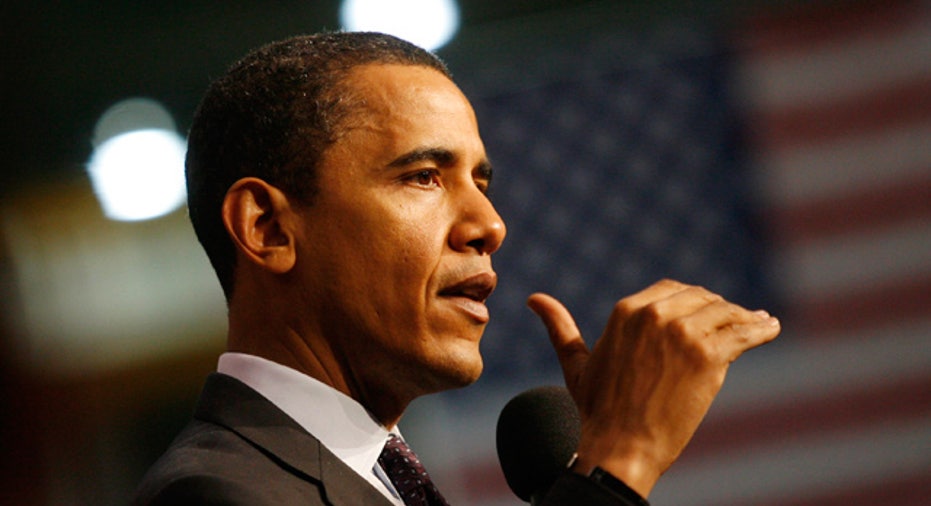Obama Betting on Lame Union Horse

The numbers don’t lie -- and they don’t bode well for the future of organized labor.
The percentage of Americans who belong to labor unions has fallen dramatically in the past three decades, from 23% in 1980 to 11.9% in 2010, according to the U.S. Bureau of Labor Statistics.
Meanwhile, the gap continues to widen between union membership rates in the public (36.2%) and private (6.9%) sectors, a disparity that has rankled taxpayers, many of whom are dealing with layoffs and cutbacks at their private sector jobs. Rankled them because private workers can’t and don’t expect the same benefits union members routinely demand, notwithstanding the stubborn economic downturn.
So on top of dwindling membership in the U.S., there’s been a growing backlash to organized labor. To wit, rancorous battles over collective bargaining rights for public employees in Wisconsin and Ohio, and running skirmishes between the governor of New Jersey and the leaders of that state’s public employee unions.
All of which raises the question of whether the Obama administration is out of step with broader public sentiment in terms of the role of organized labor in American society.
Moreover, given the rising enmity toward unions, some recent pro-labor rulings by regulatory arms of the administration appear to have done more harm than good by serving only to push the unions further outside the mainstream of public sentiment.
Ivan Osorio, a labor policy analyst with the conservative-leaning Competitive Enterprise Institute, said the Obama administration is treating the unions like a “protected industry.” And by doing so the administration “isn’t doing anyone any favors,” he said.
In reality, recent pro-union rulings by the National Labor Relations Board [NLRB], which investigates unfair labor practices, have hurt the long-term viability of organized labor by “shielding them from having to adapt to changing economic realities,” said Osorio.
In other words, times have changed and unions are no longer viewed as needed to protect vulnerable workers from predatory employers. Instead, unions are now widely seen as corrupt entities that exploit their deep political connections to push an out-of-date agenda.
Organized labor’s critics point to a recent NLRB complaint against Boeing Corp. (NYSE:BA) which seeks to bar the aerospace giant from opening a second assembly line for its 787 Dreamliner airplanes in a non-union plant in South Carolina rather than in a union plant near its headquarters outside Seattle.
The NLRB says Boeing is moving the jobs illegally to retaliate against strikes by its union member employees. Boeing says that’s ridiculous – the company just wants to build its planes in the most cost-efficient manner possible.
Either way, the ruling has led to accusations that the Obama administration condones an environment in which unions can dictate to companies where those firms can build their factories and produce their goods.
Furthermore, the ruling seems to suggest that organized labor is exerting a disproportionate amount of influence over the administration and its regulatory arms.
The criticism is especially potent if, as in the case of Boeing, a particular ruling can be portrayed as laying obstacles in the path of the economic recovery. South Carolina politicians have been very effective in framing their criticism of the ruling by arguing that it threatens 1,000 badly needed jobs at a time when the state desperately needs jobs.
Osorio suggested the NLRB ruling resulted directly from the recent failure by Democrats to pass the so-called "card check bill,' which would have made it easier for employees to organize at non-union shops.
Obama supported the bill as a candidate, but it lost steam in Congress and never made it to a vote.
According to Osorio, the failure of the card check legislation has prompted the unions to pressure the administration to promote organized labor’s agenda through other means.
“What they are doing is trying to achieve through the regulatory process what they could not through legislation,” he said. “Once the unions saw that public support for the card check bill was eroding and that Republicans would gain in the House and Senate (in last fall’s Congressional elections), they shifted towards pushing the administration through executive branch agencies like the NLRB and the National Mediation Board.”
The NLRB has denied that politics played any role in the Boeing complaint.
Nevertheless, rather than garner support for the unions, the ruling has served as a rallying point for Republican politicians who believe the NLRB and the Obama administration are favoring unions at the expense of the recovery.
“This decision has served as a lightning rod against the NLRB and is mobilizing the Republican base. They want to create this as an election issue and send a message to get the NLRB to pull back,” Harley Shaiken, a labor expert at the University of California, Berkeley told The Seattle Times.
Actually, the Boeing ruling is one of several recent NLRB actions that have drawn the ire of pro-business politicians and advocacy groups such as the U.S. Chamber of Commerce.
The five-member board, led by an Obama appointee, has promised challenges to constitutional amendments in Arizona, South Carolina, South Dakota and Utah that require secret-election ballots at companies where organized labor is seeking to form unions.
Voters last November approved the labor law changes but the NLRB has threatened to sue the states if they enforce the election results because federal law allows for card checks.
The unions oppose secret-ballots in favor of card checks, in which a union can be formed if more than 50% of a company’s employees sign a card in favor of the union. Critics of that method say it leaves employees vulnerable to pressure from union bosses.
In any case, challenges to state laws approved by voters can only add to the view that the NLRB -- and by extension the Obama administration -- is out of touch with mainstream attitudes towards unions.
For his part, Obama has not commented publicly on the Boeing ruling.



















